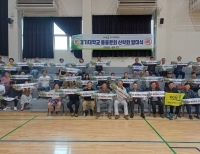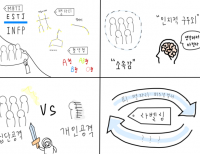"It's hard to understand the meaning of words that students use these days.“
Most young people may have heard this complaint from their parents. Nowadays, we can hear strange words easily while walking down the street. It's caused by the easy use of neologisms which transform or abbreviate our language, loanwords, and slang in our daily lives. Phenomena like this occur often on campuses. Hearing conversations, we can notice that the Korean language has deteriorated. However, students don't recognize this as a crisis and make strange words continuously.
The first characteristic of language change discovered in collegians' neologism use is that it reflects the peculiarity of society. Words of this kind primarily criticize society. For example, there are some words that relate to the travesty of youth unemployment, which is considered chronic society problem. "Tissue intern" and "gold-tern" show job applicants' difficulties being hired as permanent employee after completing their intern work. Expressions like "hell Joseon", and "fire peninsula" also reflect the tiring lives of youths who suffer in the intensly competitive Korean social structure. It's not the end. Spoon theory, which starts from the expression "gold spoon", shows the gap between the rich and the poor of modern society and its overt manifestation. "Soonsil symptom" was made to point out the problems of the previous government. Neologisms like those above filled with the judgment of youths who feel strong emotions while viewing unfortunate
society conditions, and efforts by those youths not to lose their sense of humor in spite of these bad situations are commonplace these days.
Second, they use abbreviations. "Beojeong" which stands for bus stops in Korean and "cae-ba-cae" (case by case), are examples
of abbreviations which have taken root in young people's conversation without special explanation. Words like these have become so familiar that people don't worry about the opposite party's difficulty of understanding. The most surprising fact is that these are a very small part of the extremely large number of abbreviations which are popularly used among young people. In 2017, many abbreviations were already born. "Facpok" (an abbreviation of "fact attack") means making someone be at a loss by saying a truth about a particular circumstance. It seems like abbreviations reflect the intrinsic character of Koreans who don't like things that are slow and tend to treat everything superficially and quickly. By abbreviating long words and sentences, they try to reduce the time cost during phone calls or when sending text messages and use time more efficiently.
"Is there a pure Korean language?“
Last, there is the loanword. The dictionary meaning of loanword is "a word adopted, often with some modification of its form, from one language into another." Among the many foreign languages, our country tends to rely on English too much. Sometimes it's confusing whether English is the native language or Korean. Words such as "news", "take-out", and many more are used very generally in daily life. Of course, if an idea cannot be appropriately expressed in Korean, it is sometimes convenient to use a foreign language. However, it is true that young people are accustomed to using foreign languages rather than the pure Korean language. Also, we use loanwords and foreign languages quite deliberately. Even though Korean words exist, we often use a foreign language to look like a more sophisticated and knowledgeable person. For example, there are the words "syndrome" and "sponsor." These English words are used even though there are Korean words such as "증후군 " and "후원자. " In addition, many foreign language words and expressions are used instead of the Korean equivalents.
T hese days, we commonly use loanwords and foreign languages in
combination with the Korean language. However using these words
and languages can reduce the use of Korean words and confuse the
Korean language with foreign languages. If you use foreign languages
unnecessarily, Korean will gradually cease to exist. You should try to
develop the habit of reducing the use of foreign languages in daily d
iscourse and only use the Korean language.
"존나 (Jonna)? What does it mean?“
The dictionary meaning of vulgarism is "a coarse, crude, or obscene expression." Though usually used in a disparaging spirit, it nevertheless demonstrates a feeling of closeness. "에바 "(eba), and "존나 "(jonna) are the words that we use frequently. When the subtitle of "돌+아이 " comes on television, we see it uses "존나 " (jonna) at the end of every word. You can see words that are used habitually without knowing the words are vulgarisms. It is also a big problem to live in an insensitive society where the improper use of vulgarism is common. Most vulgarisms include sexual innuendo or belittle others.
There are several reasons for creating an environment where
vulgarisms are used in everyday language. The biggest cause is the mass media. Everybody uses vulgarisms, ranging from adults to
students because of television and the Internet. Also, vulgarisms on television have greater propagation and influence.
Excessive use of vulgarisms lowers the dignity of Hangeul and transmits bad habits to future generations. The habit of using vulgarism kills the proper use of Korean words. Therefore, individual efforts to excise vulgarism use are very important.
Neologisms, loanwords and vulgarisms are frequently used in everyday life. However, neologisms, loanwords and vulgarisms are not helpful for the protection of Hangeul, which is native to Korea. With correct language habits, we will preserve Hangeul completely. The reason why King Sejong is respected is because he invented Hangeul, the unique language of our country. Although we can't receive thanks for inventing our own language every day, we must always work to preserve our own language, Hangeul.
- TAG
-
 Freedom Given to Youth: An Opportunity for Choice or a Burden of Constraint?
“Are we truly free today?” Classical literature is far more than time-honored stories. It offers profound insights into human nature and society that transcend time, remaining a valuable resource for examining the challenges our world faces today. This article will draw on George Orwell’s 1984 and Charles Dickens’ Oliver Twist to explore the contemporary issues of youth housing and the emergence of a surveillance society ...
Freedom Given to Youth: An Opportunity for Choice or a Burden of Constraint?
“Are we truly free today?” Classical literature is far more than time-honored stories. It offers profound insights into human nature and society that transcend time, remaining a valuable resource for examining the challenges our world faces today. This article will draw on George Orwell’s 1984 and Charles Dickens’ Oliver Twist to explore the contemporary issues of youth housing and the emergence of a surveillance society ...

 [단신] 산악회, 본교 동문의 버팀목이 될 수 있도록
[단신] 산악회, 본교 동문의 버팀목이 될 수 있도록
 [사회메인] 노인 인구 1,000만 시대, 준비 없는 사회가 불안해
[사회메인] 노인 인구 1,000만 시대, 준비 없는 사회가 불안해
 [네컷만화] 라벨링 문화
[네컷만화] 라벨링 문화
 [진리터] 결국 우리 모두 돌아볼 것이니
[진리터] 결국 우리 모두 돌아볼 것이니

 목록
목록










